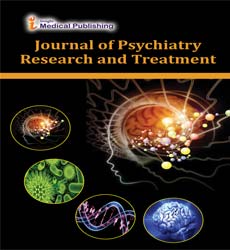Role of Genetics and Epigenetics in Psychiatric Disorders: Translational Research Advances
Gogine Leijten*
Department of Psychiatry, University of Oxford, Oxford, UK
*Corresponding author:
Gogine Leijten,
Department of Psychiatry, University of Oxford, Oxford, UK;
Email: gogine@leijten.uk
Received date: January 01, 2025, Manuscript No. Ipprt-25-20617; Editor assigned date: January 03, 2025, PreQC No. Ipprt-25-20617(PQ); Reviewed date: January 15, 2025, QC No. Ipprt-25-20617; Revised date: January 22, 2025, Manuscript No. Ipprt-25-20617(R); Published date: January 28, 2025, DOI: 10.36648/ 2471-7975.7.1.04
Citation: Leijten G (2025) Role of Genetics and Epigenetics in Psychiatric Disorders: Translational Research Advances. J Psychiatr Res Vol.07 No.1: 04
Introduction
Genetics and epigenetics play a central role in shaping the onset, progression, and treatment responsiveness of psychiatric disorders, offering critical insights into their complex biological underpinnings. While genetic studies have identified susceptibility loci and heritable risk factors for conditions such as schizophrenia, bipolar disorder, depression, and autism spectrum disorders, epigenetic mechanisms like DNA methylation, histone modification, and non-coding RNAs add an additional regulatory layer influenced by environment, stress, and lifestyle. The convergence of these domains highlights the translational potential of precision psychiatry, where molecular findings can guide more accurate diagnostics, personalized interventions, novel therapeutic strategies [1].
Description
Genetic research has significantly advanced the understanding of psychiatric disorders by uncovering polygenic risk factors and rare mutations associated with altered brain function and neurotransmission. Large-scale Genome-Wide Association Studies (GWAS) have revealed numerous risk loci across psychiatric conditions, emphasizing their highly polygenic and overlapping architecture. For instance, variants in genes regulating dopamine, serotonin, and glutamate pathways are strongly implicated in schizophrenia [2].
Depression, underscoring how genetic predisposition interacts with neurodevelopmental processes to influence disease vulnerability. However, while genetic data provide a foundation, they cannot fully explain the heterogeneity and fluctuating course of psychiatric illnesses, pointing to the need for additional layers of molecular regulation Epigenetics bridges the gap between genetic predisposition and environmental exposures, offering explanations for how stress Trauma, diet, or infections may modulate gene expression without altering the DNA sequence [3].
Epigenetic signatures such as hypermethylation of stress-regulating genes (e.g., NR3C1) or histone modification patterns in neuronal genes have been observed in patients with depression, PTSD, and schizophrenia. These mechanisms are reversible and dynamic, suggesting they could serve as both biomarkers and therapeutic targets. Epigenetic changes also explain why identical twins with the same genetic makeup may display different psychiatric outcomes, emphasizing the importance of geneâ??environment interactions. [4].
The translational advances in this field lie in applying genetic and epigenetic findings to clinical practice. Biomarker discovery is enabling earlier and more accurate diagnosis, while pharmacogenomics is guiding antidepressant and antipsychotic treatment selection based on individual genetic profiles [5].
Conclusion
The integration of genetics and epigenetics into psychiatric research represents a paradigm shift toward precision mental health care, where biological insights inform personalized prevention and treatment strategies. By recognizing the interplay of inherited risk, molecular regulation, and environmental influence, researchers are moving closer to unraveling the complexity of psychiatric disorders. Translational advances in this field promise not only improved diagnostics and targeted therapies but also a deeper understanding of the biological roots of mental illness, paving the way for a more effective and holistic approach to psychiatric care.
Acknowledgment
None.
Conflict of Interest
None.
References
- Jaiswal S, Bag A, Bhandari SS (2022) Gut microbiota and psychiatric disorders. Open J Psychiatry Allied Sci 13: 90–93
Google Scholar Cross Ref Indexed at
- Alharthi A, Alhazmi S, Alburae N, Bahieldin A (2022) The human gut microbiome as a potential factor in autism spectrum disorder. Int J Mol Sci 23: 1363
Google Scholar Cross Ref Indexed at
- Saurman V, Margolis KG, Luna RA (2020) Autism spectrum disorder as a brain-gut-microbiome axis disorder. Dig Dis Sci 65: 818–828
Google Scholar Cross Ref Indexed at
- Li Q, Han Y, Dy ABC, Hagerman RJ (2017) The gut microbiota and autism spectrum disorders. Front Cell Neurosci 11: 120
Google Scholar Cross Ref Indexed at
- Cenit MC, Sanz Y, Codoñer-Franch P (2017) Influence of gut microbiota on neuropsychiatric disorders. World J Gastroenterol 23: 5486–5498
Open Access Journals
- Aquaculture & Veterinary Science
- Chemistry & Chemical Sciences
- Clinical Sciences
- Engineering
- General Science
- Genetics & Molecular Biology
- Health Care & Nursing
- Immunology & Microbiology
- Materials Science
- Mathematics & Physics
- Medical Sciences
- Neurology & Psychiatry
- Oncology & Cancer Science
- Pharmaceutical Sciences
